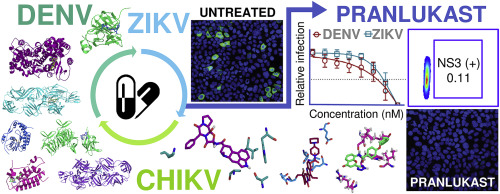当前位置:
X-MOL 学术
›
Antivir. Res.
›
论文详情
Our official English website, www.x-mol.net, welcomes your
feedback! (Note: you will need to create a separate account there.)
In silico drug repurposing for the identification of potential candidate molecules against arboviruses infection.
Antiviral Research ( IF 4.5 ) Pub Date : 2019-11-28 , DOI: 10.1016/j.antiviral.2019.104668 Diana Montes-Grajales 1 , Henry Puerta-Guardo 2 , Diego A Espinosa 2 , Eva Harris 2 , William Caicedo-Torres 3 , Jesus Olivero-Verbel 1 , Esperanza Martínez-Romero 4
Antiviral Research ( IF 4.5 ) Pub Date : 2019-11-28 , DOI: 10.1016/j.antiviral.2019.104668 Diana Montes-Grajales 1 , Henry Puerta-Guardo 2 , Diego A Espinosa 2 , Eva Harris 2 , William Caicedo-Torres 3 , Jesus Olivero-Verbel 1 , Esperanza Martínez-Romero 4
Affiliation

|
Arboviral diseases caused by dengue (DENV), Zika (ZIKV) and chikungunya (CHIKV) viruses represent a major public health problem worldwide, especially in tropical areas where millions of infections occur every year. The aim of this research was to identify candidate molecules for the treatment of these diseases among the drugs currently available in the market, through in silico screening and subsequent in vitro evaluation with cell culture models of DENV and ZIKV infections. Numerous pharmaceutical compounds from antibiotics to chemotherapeutic agents presented high in silico binding affinity for the viral proteins, including ergotamine, antrafenine, natamycin, pranlukast, nilotinib, itraconazole, conivaptan and novobiocin. These five last compounds were tested in vitro, being pranlukast the one that exhibited the best antiviral activity. Further in vitro assays for this compound showed a significant inhibitory effect on DENV and ZIKV infection of human monocytic cells and human hepatocytes (Huh-7 cells) with potential abrogation of virus entry. Finally, intrinsic fluorescence analyses suggest that pranlukast may have some level of interaction with three viral proteins of DENV: envelope, capsid, and NS1. Due to its promising results, suitable accessibility in the market and reduced restrictions compared to other pharmaceuticals; the anti-asthmatic pranlukast is proposed as a drug candidate against DENV, ZIKV, and CHIKV, supporting further in vitro and in vivo assessment of the potential of this and other lead compounds that exhibited good affinity scores in silico as therapeutic agents or scaffolds for the development of new drugs against arboviral diseases.
中文翻译:

在计算机电子学中重新定位,用于鉴定抗虫媒病毒感染的潜在候选分子。
由登革热(DENV),寨卡病毒(ZIKV)和基孔肯雅热(CHIKV)病毒引起的虫媒病毒疾病是全球主要的公共卫生问题,尤其是在每年发生数百万例感染的热带地区。这项研究的目的是通过计算机筛选以及随后用DENV和ZIKV感染的细胞培养模型进行体外评估,从而在市场上当前可用的药物中确定用于治疗这些疾病的候选分子。从抗生素到化学治疗剂的多种药物化合物均对病毒蛋白具有高度的计算机吸附结合亲和力,包括麦角胺,阿曲芬宁,那他霉素,普鲁司特,尼洛替尼,伊曲康唑,康尼普坦和新霉素。这最后五种化合物在体外进行了测试,普兰司特是表现出最佳抗病毒活性的化合物。对该化合物的进一步体外测定表明,对人单核细胞和人肝细胞(Huh-7细胞)的DENV和ZIKV感染具有显着的抑制作用,并可能消除病毒的进入。最后,固有荧光分析表明,普仑司特可能与DENV的三种病毒蛋白(包膜,衣壳和NS1)有一定程度的相互作用。与其他药物相比,由于其令人鼓舞的结果,适当的市场可及性和减少的限制;建议将抗哮喘的普卢司特用作DENV,ZIKV和CHIKV的候选药物,支持进一步体外和体内评估该药物和其他先导化合物在计算机中表现出良好亲和力得分的潜力,作为该药物的治疗剂或支架。开发抗虫媒病毒疾病的新药。
更新日期:2019-11-28
中文翻译:

在计算机电子学中重新定位,用于鉴定抗虫媒病毒感染的潜在候选分子。
由登革热(DENV),寨卡病毒(ZIKV)和基孔肯雅热(CHIKV)病毒引起的虫媒病毒疾病是全球主要的公共卫生问题,尤其是在每年发生数百万例感染的热带地区。这项研究的目的是通过计算机筛选以及随后用DENV和ZIKV感染的细胞培养模型进行体外评估,从而在市场上当前可用的药物中确定用于治疗这些疾病的候选分子。从抗生素到化学治疗剂的多种药物化合物均对病毒蛋白具有高度的计算机吸附结合亲和力,包括麦角胺,阿曲芬宁,那他霉素,普鲁司特,尼洛替尼,伊曲康唑,康尼普坦和新霉素。这最后五种化合物在体外进行了测试,普兰司特是表现出最佳抗病毒活性的化合物。对该化合物的进一步体外测定表明,对人单核细胞和人肝细胞(Huh-7细胞)的DENV和ZIKV感染具有显着的抑制作用,并可能消除病毒的进入。最后,固有荧光分析表明,普仑司特可能与DENV的三种病毒蛋白(包膜,衣壳和NS1)有一定程度的相互作用。与其他药物相比,由于其令人鼓舞的结果,适当的市场可及性和减少的限制;建议将抗哮喘的普卢司特用作DENV,ZIKV和CHIKV的候选药物,支持进一步体外和体内评估该药物和其他先导化合物在计算机中表现出良好亲和力得分的潜力,作为该药物的治疗剂或支架。开发抗虫媒病毒疾病的新药。











































 京公网安备 11010802027423号
京公网安备 11010802027423号